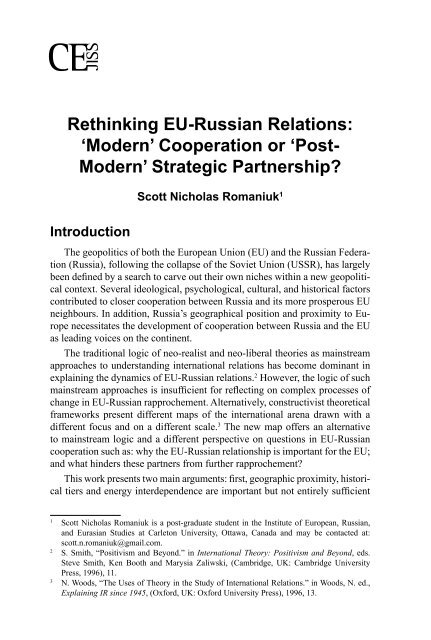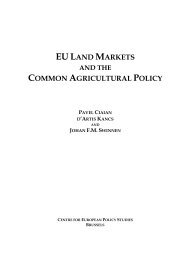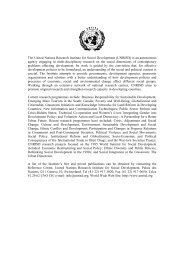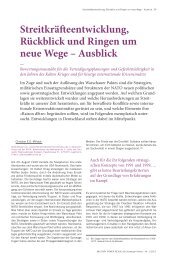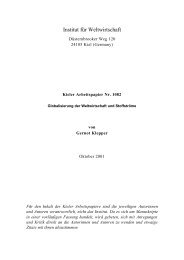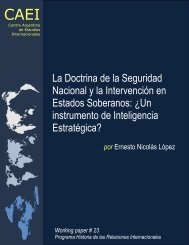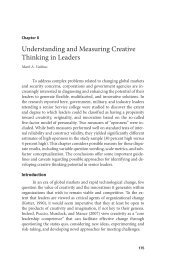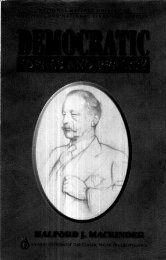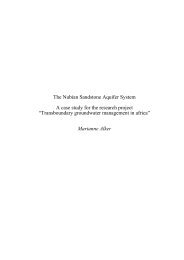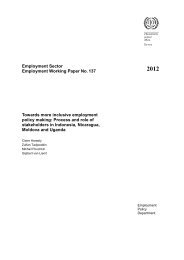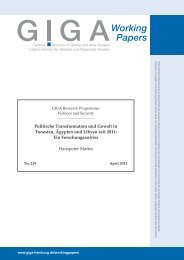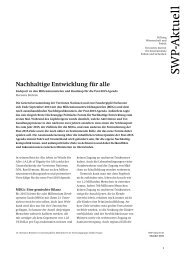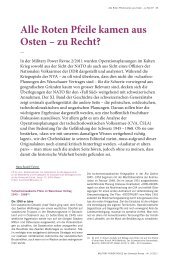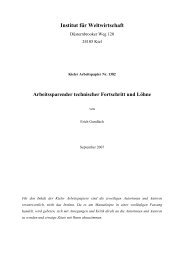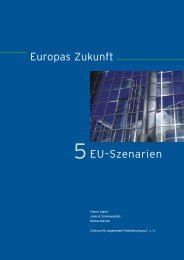Rethinking EU-Russian Relations: 'Modern' Cooperation or 'Post ...
Rethinking EU-Russian Relations: 'Modern' Cooperation or 'Post ...
Rethinking EU-Russian Relations: 'Modern' Cooperation or 'Post ...
Create successful ePaper yourself
Turn your PDF publications into a flip-book with our unique Google optimized e-Paper software.
CE<br />
90<br />
JISS<br />
<strong>Rethinking</strong> <strong>EU</strong>-<strong>Russian</strong> <strong>Relations</strong>:<br />
‘Modern’ <strong>Cooperation</strong> <strong>or</strong> ‘Post-<br />
Modern’ Strategic Partnership?<br />
Introduction<br />
Scott Nicholas Romaniuk 1<br />
The geopolitics of both the European Union (<strong>EU</strong>) and the <strong>Russian</strong> Federation<br />
(Russia), following the collapse of the Soviet Union (USSR), has largely<br />
been defi ned by a search to carve out their own niches within a new geopolitical<br />
context. Several ideological, psychological, cultural, and hist<strong>or</strong>ical fact<strong>or</strong>s<br />
contributed to closer cooperation between Russia and its m<strong>or</strong>e prosperous <strong>EU</strong><br />
neighbours. In addition, Russia’s geographical position and proximity to Europe<br />
necessitates the development of cooperation between Russia and the <strong>EU</strong><br />
as leading voices on the continent.<br />
The traditional logic of neo-realist and neo-liberal the<strong>or</strong>ies as mainstream<br />
approaches to understanding international relations has become dominant in<br />
explaining the dynamics of <strong>EU</strong>-<strong>Russian</strong> relations. 2 However, the logic of such<br />
mainstream approaches is insuffi cient f<strong>or</strong> refl ecting on complex processes of<br />
change in <strong>EU</strong>-<strong>Russian</strong> rapprochement. Alternatively, constructivist the<strong>or</strong>etical<br />
framew<strong>or</strong>ks present different maps of the international arena drawn with a<br />
different focus and on a different scale. 3 The new map offers an alternative<br />
to mainstream logic and a different perspective on questions in <strong>EU</strong>-<strong>Russian</strong><br />
cooperation such as: why the <strong>EU</strong>-<strong>Russian</strong> relationship is imp<strong>or</strong>tant f<strong>or</strong> the <strong>EU</strong>;<br />
and what hinders these partners from further rapprochement?<br />
This w<strong>or</strong>k presents two main arguments: fi rst, geographic proximity, hist<strong>or</strong>ical<br />
tiers and energy interdependence are imp<strong>or</strong>tant but not entirely suffi cient<br />
1 Scott Nicholas Romaniuk is a post-graduate student in the Institute of European, <strong>Russian</strong>,<br />
and Eurasian Studies at Carleton University, Ottawa, Canada and may be contacted at:<br />
scott.n.romaniuk@gmail.com.<br />
2 S. Smith, “Positivism and Beyond.” in International The<strong>or</strong>y: Positivism and Beyond, eds.<br />
Steve Smith, Ken Booth and Marysia Zaliwski, (Cambridge, UK: Cambridge University<br />
Press, 1996), 11.<br />
3 N. Woods, “The Uses of The<strong>or</strong>y in the Study of International <strong>Relations</strong>.” in Woods, N. ed.,<br />
Explaining IR since 1945, (Oxf<strong>or</strong>d, UK: Oxf<strong>or</strong>d University Press), 1996, 13.
<strong>Rethinking</strong> <strong>EU</strong>-<strong>Russian</strong> <strong>Relations</strong> | 71<br />
f<strong>or</strong> explaining the necessity of <strong>EU</strong>-<strong>Russian</strong> cooperation f<strong>or</strong> the <strong>EU</strong>. This w<strong>or</strong>k<br />
argues that, f<strong>or</strong> the <strong>EU</strong>, cooperation with Russia is about demonstrating the<br />
<strong>EU</strong>’s ‘presence’ and deploying different types of cooperative models in <strong>or</strong>der<br />
to change the existing political realities, to confi rm the <strong>EU</strong>’s status of a transf<strong>or</strong>mative<br />
power, and Westernise Russia. 4<br />
Secondly, it is not confl icting interests, but rather n<strong>or</strong>ms-based tensions that<br />
paradoxically arise in <strong>EU</strong>-<strong>Russian</strong> cooperation. These tensions emerge as a<br />
result of the different nature of the partners – Russia as a self-interested modern<br />
state, and the <strong>EU</strong> as a post-modern act<strong>or</strong> – which may prevent partners from<br />
further rapprochement. <strong>EU</strong>-<strong>Russian</strong> cooperation is understood in this w<strong>or</strong>k as<br />
the process of international socialisation, which brings changes, constructs new<br />
realities, builds new practices and often triggers tensions between the partners.<br />
The fi rst section of this w<strong>or</strong>k focuses on how constructivist the<strong>or</strong>y and<br />
methodological fi ndings present an alternative to conventional approaches in<br />
understanding <strong>EU</strong>-<strong>Russian</strong> cooperation. The second section discusses the imp<strong>or</strong>tance,<br />
uniqueness and necessity of <strong>EU</strong>-<strong>Russian</strong> cooperation f<strong>or</strong> the <strong>EU</strong>. The<br />
fi nal section demonstrates why there are diffi culties with further rapprochement<br />
with negotiations over a new Partnership and <strong>Cooperation</strong> Agreement between<br />
the <strong>EU</strong> and Russia in the context of the simmering Russo-Ge<strong>or</strong>gia confl ict.<br />
With respect to the methodological aspects of this w<strong>or</strong>k, ideas and n<strong>or</strong>ms play<br />
an independent causal role f<strong>or</strong> constructivism, and the task is to try to establish<br />
c<strong>or</strong>relation between ideas, n<strong>or</strong>ms and their impact on act<strong>or</strong>s.<br />
Alternative Approaches to Understanding<br />
<strong>EU</strong>-<strong>Russian</strong> Rapprochement<br />
In less than two decades the relationship between the <strong>EU</strong> and Russia has<br />
transf<strong>or</strong>med from exclusively bilateral relations between some of the European<br />
Community’s members and the USSR, to a partnership between the <strong>EU</strong> and<br />
Russia. These act<strong>or</strong>s now cooperate and establish new realities that were inconceivable<br />
during the Cold War. Russia has been the subject of many fundamental<br />
policy documents, policy implementation instruments and internal discussions<br />
over the past ten years, and the density and frequency of bilateral dialogue<br />
between Russia and the <strong>EU</strong> is remarkable.<br />
Partners wilfully interact in different spheres, which assist the <strong>EU</strong> in building<br />
new models of cooperation. These models are subsequently applied to<br />
numerous Soviet-success<strong>or</strong> states, particularly Ukraine, Belarus, and Moldova. 5<br />
M<strong>or</strong>eover, as Trenin contends, the <strong>EU</strong>’s interests towards Russia lies in the<br />
sphere of deep transf<strong>or</strong>mation, Westernisation and cooperation with Russia,<br />
4 C. Bretherton, and J. Vogler, The European Union as a Global Act<strong>or</strong>, (London, UK and New<br />
Y<strong>or</strong>k, NY: Routledge, 2006), 24.<br />
5 Kashkin, S. Pravo Evropeiskogo Sojuza, (Moscow: Jurist, 2002), 889.
72 | Scott Nicholas Romaniuk<br />
and not as a potential member of the <strong>EU</strong> as was the case with the f<strong>or</strong>mer<br />
Warsaw Pact states (the Czech Republic, Hungary, Poland, Slovakia). 6 Theref<strong>or</strong>e,<br />
Russia – along with other emerging global players, such as China, India<br />
and Brazil – creates a basis f<strong>or</strong> the <strong>EU</strong>’s exercise of an effective multilateral<br />
international approach to cooperation with an imp<strong>or</strong>tant act<strong>or</strong> not aspiring to<br />
join <strong>EU</strong> institutions. 7<br />
<strong>EU</strong>-<strong>Russian</strong> relations remain contradict<strong>or</strong>y and diffi cult. Such accounts<br />
include legacies of the Cold War, which saw distrust, ambiguity over common<br />
strategic goals that continue to surface in the contemp<strong>or</strong>ary period, as<br />
well as asymmetry in levels of economic development. 8 These accounts create<br />
favourable conditions f<strong>or</strong> the abundance of predominantly neo-realist and neoliberal<br />
approaches to understanding <strong>EU</strong>-<strong>Russian</strong> relations in both Western and<br />
<strong>Russian</strong> academic literature. Accounts from both schools negatively interpret<br />
the current situation and future perspectives of cooperation, and underestimate<br />
achievements as a result.<br />
Such views of <strong>EU</strong>-<strong>Russian</strong> relations are often exclusively based on disparities<br />
and focused on the realist notion of ‘balance of power’ and of Russia’s<br />
opposition to any “institutional arrangements on the continent which acc<strong>or</strong>d<br />
[Russia] only a marginal role.” 9 M<strong>or</strong>eover, as liberal institutionalists observe,<br />
institutions in Europe are mostly defi ned as “Western in political <strong>or</strong>igin and<br />
focus.” 10 This verity creates additional tensions with Russia whose modes of<br />
governance are out-of-sync with <strong>EU</strong> standards.<br />
Other confl icting interests are illustrated in the <strong>EU</strong>-<strong>Russian</strong> energy dialogue,<br />
in particular the ratifi cation of the so-called Energy Charter. 11 Ratifi cation of<br />
the Charter would help the <strong>EU</strong> diversify its energy imp<strong>or</strong>ts and enhance the<br />
sustainability of energy supplies. 12 However, Russia is attempting to defend its<br />
position as a key energy supplier to the European market, 13 which confl icts with<br />
6 Trenin, D. Integratsiia i identichnost’: Rossiia kak ‘Noviǐ Zapad’, (Moscow, 2006), Chapter 4.<br />
7 Grevi, G. and Vasconcelos, A. “Partnerships f<strong>or</strong> effective multilateralism: <strong>EU</strong> relations with<br />
Brazil, China, India and Russia,” <strong>EU</strong>ISS: Chaillot Paper #109, 2008, 9.<br />
8 H. Арбатова, (N. Arbatova), The Black Sea Regional <strong>Cooperation</strong> in the Context of the<br />
<strong>EU</strong>-Russia <strong>Relations</strong>, (Berlin: International Conference, May 2007), 1 and 2; T. Aleseeva,<br />
“Rossiia v prostranstve globalnogo vospriiatiia,” Mezhdunarodnye Protsessy, Vol. 5, No.<br />
2/14, (2007) available at: ; J. B<strong>or</strong>ko, and A.<br />
But<strong>or</strong>ina, Evropeiskii Sojuz v XXI veke: vibiraja strategiju razvitija, (Moscow, 2001), 41.<br />
9 Webber, M. “Introduction: Russia and Europe—Confl ict <strong>or</strong> cooperation?” in M. Webber,<br />
ed., Russia and Europe: Confl ict <strong>or</strong> <strong>Cooperation</strong>, (Houndmills, Basingstoke, Hampshire:<br />
Macmillan Press, 2000), 7.<br />
10 Ibid, 15.<br />
11 D. Johnson, “<strong>EU</strong>-<strong>Russian</strong>n Energy Links: A Marriage of Convenience?” Government and<br />
Opposition, Vol. 40, No. 2, (2004), 256–258.<br />
12 Voloshin, V. <strong>EU</strong>-<strong>Russian</strong> Energy Dialogue. RECEP, 2004, 31. .<br />
13 R. Seidelmann, “Decision-making in <strong>EU</strong>’s CFSP: Defi cits and Perspectives,” in A Focus on<br />
<strong>EU</strong>-<strong>Russian</strong> <strong>Relations</strong>, ed. K.Westphal. (Frankfurt am Main: Peter Lang, 2005), 59.
<strong>Rethinking</strong> <strong>EU</strong>-<strong>Russian</strong> <strong>Relations</strong> | 73<br />
the interests of <strong>EU</strong>-based companies to access <strong>Russian</strong> resources and modernise<br />
Russia’s energy infrastructure. 14<br />
Population mobility and security on the <strong>EU</strong>’s b<strong>or</strong>ders is increasingly becoming<br />
a key issue, especially since the <strong>EU</strong>’s Eastern Enlargement (2004, 2007),<br />
which considerably expanded the common <strong>EU</strong>-<strong>Russian</strong> b<strong>or</strong>der. 15 Personifi ed<br />
power and autocratic features of the <strong>Russian</strong> political environment and socalled<br />
‘imitative democracy’ of a “<strong>Russian</strong> system” and its mechanisms of<br />
governance also present a maj<strong>or</strong> component to discourses on competing and<br />
irreconcilable interests in <strong>EU</strong>-<strong>Russian</strong> cooperation. 16<br />
Nonetheless, <strong>EU</strong>-<strong>Russian</strong> cooperation is not only based on deriving economic<br />
benefi ts, striking a ‘balance of power,’ decreasing transaction costs<br />
(within the framew<strong>or</strong>k of energy dialogue), promoting reliability and security<br />
on the <strong>EU</strong>’s eastern b<strong>or</strong>ders, <strong>or</strong> drafting f<strong>or</strong>malised agreements. Undoubtedly,<br />
the <strong>EU</strong>’s recognition of Russia as a partner is of great imp<strong>or</strong>tance f<strong>or</strong> the latter,<br />
which altered its constitutional status and embarked upon a new course of<br />
democratic transf<strong>or</strong>mations.<br />
Of no less signifi cance is that the <strong>EU</strong> has become “the main tool f<strong>or</strong> Russia’s<br />
modernisation.” 17 Technical Aid to the Commonwealth of Independent States<br />
(CIS), (TACIS), trans-b<strong>or</strong>der cooperation through INTERREG (Community<br />
initiative that aims to stimulate interregional cooperation in the <strong>EU</strong>) mechanisms,<br />
the N<strong>or</strong>thern Dimension initiative and cooperation through the Council<br />
of the Baltic Sea States demonstrate some of <strong>EU</strong>’s modernisation tools. 18<br />
Theref<strong>or</strong>e, as section two below demonstrates, <strong>EU</strong> cooperation with Russia<br />
concerns demonstrating the <strong>EU</strong>’s presence, 19 and “international personality” of<br />
a transf<strong>or</strong>mative power and co-<strong>or</strong>dinating its actions as well as further unifying<br />
its position when it comes to cooperation and partnership models. 20<br />
Traditional, m<strong>or</strong>e mainstream approaches note that tensions and confl ict in<br />
cooperation are based on a clash of diverse, and what appears to be, irreconcilable<br />
interests that prevent partners from reaching further rapprochement. Such<br />
14 V. Voloshin, “<strong>EU</strong>-<strong>Russian</strong> Energy Dialogue.” RECEP, 2004, 31..<br />
15 H. Grabbe, “The Sharp Edges of Europe: Extending Schengen Eastwards.” International<br />
Affairs, Vol. 76, No. 3, (2000), 528.<br />
16 L. Shevtsova, “Political leadership in Russia’s transf<strong>or</strong>mation.” in A. J. Motyl, B. A. Ruble<br />
and L. Shevtsova. eds., Russia’s Engagement with the West: Transf<strong>or</strong>mation and Integration<br />
in the Twenty-First Century, (Armonk, NY: M. E. Sharpe, 2005), 111–113.<br />
17 “The <strong>Russian</strong> Federation Middle Term Strategy towards The European Union,” October<br />
1999. .<br />
18 The European Commission’s Delegation Offi cial Site. TACIS, INTERREG, “N<strong>or</strong>thern<br />
Dimension, Council of the Baltic Sea States,” .<br />
19 C. Bretherton, and J. Vogler, The European Union as a Global Act<strong>or</strong>, (London, UK and New<br />
Y<strong>or</strong>k, NY: Routledge, 2006), 24.<br />
20 D. Long, “Transatlantic <strong>Relations</strong> and Canadian F<strong>or</strong>eign Policy,” International Journal, Vol.<br />
58, No. 4, (2003). 1.
74 | Scott Nicholas Romaniuk<br />
a wide explanation of existing tensions between the <strong>EU</strong> and Russia has gained<br />
explanat<strong>or</strong>y power as a result of the concentration on unchangeable, exogenous<br />
interests widespread in neoliberal and ne<strong>or</strong>ealist accounts. 21<br />
Following m<strong>or</strong>e traditional explanations f<strong>or</strong> tensions, it is essential to recognise<br />
that there are numerous common interests that should bring both partners<br />
closer together. F<strong>or</strong> example, as Arbatova emphasizes, partners have common<br />
interests regarding threats to European and international security, stability<br />
in a wider Europe, and especially, CIS space. 22 Co<strong>or</strong>dinating their actions,<br />
both partners could pursue a common goal of developing regional multilateral<br />
mechanisms and achieve their own project of constructing a rational w<strong>or</strong>ld<br />
<strong>or</strong>der, independent of the US. 23 As a result of possessing both over-lapping and<br />
confl icting interests, it is possible to bargain in areas where transaction costs are<br />
low, and elab<strong>or</strong>ate common institutional mechanisms to make these agreements<br />
w<strong>or</strong>k; thus compromising on diverse interests. 24<br />
Concentrating on areas of mutual interest and “manage controversial<br />
high-stakes issues delicately” is indeed possible. 25 Such a solution may supp<strong>or</strong>t<br />
integration and rapprochement but only if the partners decide to integrate<br />
wherever possible and necessary. 26 Energy cooperation without well-defi ned<br />
shared strategic goals may, f<strong>or</strong> instance, lead to m<strong>or</strong>e acute disagreements<br />
which could prevent the partners from f<strong>or</strong>mulating precise strategic pri<strong>or</strong>ities<br />
and long-term plans. 27 The example of the Common European Economic Space<br />
(CEES) further demonstrates how issues with energy dialogue can be avoided<br />
<strong>or</strong> even potentially ameli<strong>or</strong>ated.<br />
The CEES is not a single market, although the removal of obstacles f<strong>or</strong><br />
the free fl ow of goods, services, capital and labour are all mentioned in the<br />
document except f<strong>or</strong> the customs union which is one of the main features of<br />
a single market approach. The CEES has characteristics of a free-trade zone<br />
with cross-b<strong>or</strong>der trading of goods and services though it is not fully integrated<br />
and lacks a common currency, monetary policy and supranational bodies to<br />
21 A. Wendt, “Anarchy is what States make of it: The Social Construction of Power Politics,”<br />
International Organization, Vol. 46, No. 2, (1992), 392–394. Wendt suggests that both<br />
neo-liberals and neo-realists built their arguments on an assumption that it is behaviour, not<br />
interests that can change.<br />
22 H. Арбатова, (N. Arbatova), “Obshchee prostranstvo bezopasnosti mezhdu Rossieǐ i ES:<br />
imperativy I pripiatstviia,” Indeks Bezopasnosti, Vol. 3, No. 86/14, (2008), 64.<br />
23 H. Арбатова, Н, (N. Arbatova), “Obshchee prostranstvo bezopasnosti mezhdu Rossieǐ i ES:<br />
imperativy I pripiatstviia,” Indeks Bezopasnosti, Vol. 3, No. 86/14, (2008), 64.<br />
24 A. M<strong>or</strong>avcsik, “A New Statecraft? Supranational Entrepreneurs and International<br />
<strong>Cooperation</strong>,” International Organization, No. 53, (1999), 270.<br />
25 A. M<strong>or</strong>avcsik, “Striking a New Transatlantic Bargain,” F<strong>or</strong>eign Affairs, Vol. 82, No. 4,<br />
(2003), 75.<br />
26 T. B<strong>or</strong>dachev, “Na puti k strategicheskomy soǐuzu,” Russia in Global Affairs, No. 1, (2006).<br />
.<br />
27 H. Арбатова, (N. Arbatova), “Obshchee prostranstvo bezopasnosti mezhdu Rossieǐ i ES:<br />
imperativy I pripiatstviia,” Indeks Bezopasnosti, Vol. 3, No. 86/14, (2008), 64 and 69.
<strong>Rethinking</strong> <strong>EU</strong>-<strong>Russian</strong> <strong>Relations</strong> | 75<br />
govern common economic activities. 28 Energy related problems could block<br />
developments within the CEES project however, its fl exible approach allows<br />
f<strong>or</strong> the improvement of cooperation in certain areas where c<strong>or</strong>e interests are<br />
not at stake, and to selectively integrate. As a result of this selective, fl exible<br />
model of cooperation, <strong>EU</strong>-<strong>Russian</strong> trade in the fi rst seven months of 2008 grew<br />
by some €36.5 billion to €165.3. 29<br />
Constructivists would argue that interests are changeable, fl exible and<br />
dependant30 on dialectical agent-structure relations. 31 As the discussion on the<br />
process of tracing hist<strong>or</strong>ical developments of cooperation demonstrates below,<br />
cooperation becomes a self-evident practice and a social fact based on ‘human<br />
agreement’ that is perceived as objective so long as the agreement exists. 32<br />
Partners prescribe m<strong>or</strong>e meaning to this cooperation constituting new realities<br />
and constructing new structural and institutional conditions, which in response,<br />
constrain partners’ egoistic interests <strong>or</strong> enable their behaviour.<br />
It is doubtful that interests are the main cause f<strong>or</strong> tensions in <strong>EU</strong>-<strong>Russian</strong><br />
cooperation. Despite eff<strong>or</strong>ts to legally f<strong>or</strong>malize, institutionalize, and prescribe<br />
meaning to cooperation over a relatively long period of time, confl icts<br />
and contention endure. This contributes to instability in rapprochement between<br />
the <strong>EU</strong> and Russia. The paradox recalls the need f<strong>or</strong> constructivists<br />
to provide the<strong>or</strong>etical tools and explain the reasons f<strong>or</strong> reoccurring confl icts<br />
beyond what mainstream approaches provide. In this, section three (below)<br />
expl<strong>or</strong>es a relatively neglected area of confl ict and demonstrates that the<br />
issues with n<strong>or</strong>ms continuously occupy an imp<strong>or</strong>tant place in <strong>EU</strong>-<strong>Russian</strong><br />
relations. 33<br />
Although constructivism questions the exogenous character of interests<br />
and the claimed ‘objectivism’ of analytical blocks found in m<strong>or</strong>e mainstream<br />
approaches, it does not completely reject the material ontology of mainstream<br />
approaches by combining analysis of material structures with the study of<br />
ideational fact<strong>or</strong>s, so-called ‘social ontology,’ “shared understandings” 34 and<br />
28 “Road Maps of Four <strong>EU</strong>-<strong>Russian</strong> Common Spaces,” May 2007: .<br />
29 P. Runner, (11 November 2008), “Lithuania complicates French rapprochement with Russia,”<br />
.<br />
30 A. Wendt, “Anarchy is what States make of it: The Social Construction of Power Politics,”<br />
International Organization, Vol. 46, No. 2, (1992), 394.<br />
31 C. Bretherton, and J. Vogler, The European Union as a Global Act<strong>or</strong>, (London, UK and New<br />
Y<strong>or</strong>k, NY: Routledge, 2006), 22.<br />
32 M. Barnett, “Social Constructivism,” in J. Baylis and S. Smith eds., The Globalization of<br />
W<strong>or</strong>ld Politics: An Introduction to International <strong>Relations</strong>, 3rd ed (Oxf<strong>or</strong>d, UK: Oxf<strong>or</strong>d<br />
University Press, 2005), 259.<br />
33 F. Splidsboel-Hansen, “Russia's <strong>Relations</strong> with the European Union: A Constructivist Cut,”<br />
International Politics, No. 39, (2002), 414.<br />
34 K. M. Fierke, “Constructivism,” in T. Dunne, M. Kurki, and S. Smith eds., International<br />
<strong>Relations</strong> The<strong>or</strong>ies: Discipline and Diversity, (Oxf<strong>or</strong>d, UK and New Y<strong>or</strong>k, NY: Oxf<strong>or</strong>d<br />
University Press, 2006), 170.
76 | Scott Nicholas Romaniuk<br />
inter-subjective meanings. 35 Theref<strong>or</strong>e, <strong>EU</strong>-<strong>Russian</strong> relations are “in a way,<br />
socially constructed” f<strong>or</strong> the chosen the<strong>or</strong>etical approach. 36<br />
In practice, it is diffi cult to demonstrate the causal power of ideas and n<strong>or</strong>ms<br />
established in agreements. M<strong>or</strong>eover, interaction between the <strong>EU</strong> and Russia<br />
is evolving inasmuch as it is still in the process of ‘becoming’ and has not<br />
achieved its ends. The ongoing process of <strong>EU</strong>-<strong>Russian</strong> relations makes it diffi<br />
cult to f<strong>or</strong>m judgments about the partnership exclusively in terms of success<br />
<strong>or</strong> failure. A partial solution to these concerns in <strong>EU</strong>-<strong>Russian</strong> cooperation, process<br />
tracing of cooperation, textual analysis of fundamental offi cial documents<br />
together with examination of an academic discourse is deployed as instruments<br />
of interpretive methodology. Textual analysis and academic discourse provides<br />
means f<strong>or</strong> understanding the impact that cooperation has on the <strong>EU</strong>, and the<br />
fact<strong>or</strong>s that subsequently induce confl ict between the partners.<br />
Since <strong>EU</strong>-<strong>Russian</strong> relations are examined through the process of international<br />
socialisation, it is necessary to apply ‘hist<strong>or</strong>icisation’ – constructivists’<br />
methodological tools – to hist<strong>or</strong>ically contextualise fi ndings. 37 Tracing the<br />
hist<strong>or</strong>ical evolution of meanings is also a necessary step since these are prescribed<br />
by act<strong>or</strong>s to the imp<strong>or</strong>tance of cooperation and which have made further<br />
development of cooperation possible. 38 Such methodological solutions provide<br />
an analytically operational alternative to traditional mainstream approaches<br />
in the <strong>EU</strong> studies, which rests on both the material and the ideational w<strong>or</strong>lds.<br />
The Necessity of <strong>EU</strong> <strong>Cooperation</strong> with Russia<br />
Within the context of changing realities presented by a globalising w<strong>or</strong>ld,<br />
a web of economic, social, political and cultural netw<strong>or</strong>ks de-b<strong>or</strong>der existing<br />
local and national systems of governance. 39 As a result, new regional and<br />
global terrains have emerged. On one hand – and applicable to <strong>EU</strong>-<strong>Russian</strong><br />
cooperation – it is not immediately apparent whether the <strong>EU</strong> is inevitably a<br />
global act<strong>or</strong> and a leading voice f<strong>or</strong> Europe, <strong>or</strong> not. On the other hand, where<br />
Russia fi ts – in terms of its internal transf<strong>or</strong>mations and external f<strong>or</strong>eign policy<br />
choices – is equally ambiguous. In other w<strong>or</strong>ds it is unclear how strong an act<strong>or</strong><br />
Russia will be in the future. However, even today both the <strong>EU</strong> and Russia may<br />
be considered as having an international ‘act<strong>or</strong>ness’ about them since both<br />
35 M. Barnett, “Social Constructivism,” in J. Baylis and S. Smith (eds), The Globalization of<br />
W<strong>or</strong>ldPolitics: An Introduction to International <strong>Relations</strong>, 3rd ed, (Oxf<strong>or</strong>d, UK: Oxf<strong>or</strong>d<br />
University Press, 2005), 253.<br />
36 A. Wendt, “Anarchy is what States make of it: The Social Construction of Power Politics,”<br />
International Organization, Vol. 46, No. 2, (1992), 394.<br />
37 V. Pouliot, “‘Sobjectivism’: Toward a Constructivist Methodology,” International Studies<br />
Quarterly, Vol. 51, No. 2, (2007), 360.<br />
38 Ibid, 360.<br />
39 J. Habermas, “Toward a Cosmopolitan Europe,” Journal of Democracy, Vol. 14, No. 4,<br />
(2003), 88.
<strong>Rethinking</strong> <strong>EU</strong>-<strong>Russian</strong> <strong>Relations</strong> | 77<br />
have suffi cient internal capabilities such as available resources, political will,<br />
and the degree of autonomy to cooperate meet external demands placed on<br />
them, such as the ability to construct multilateral institutions and respond to<br />
common threats. 40<br />
The imp<strong>or</strong>tance, uniqueness, and necessity of <strong>EU</strong>-<strong>Russian</strong> cooperation f<strong>or</strong><br />
the <strong>EU</strong> as an international act<strong>or</strong> are the focus of this section. The second part of<br />
this w<strong>or</strong>k traces the main stages of cooperation through the process of the adoption<br />
of fundamental documents as the fi nal outputs in <strong>EU</strong>-<strong>Russian</strong> cooperation,<br />
and examines some implications these documents have f<strong>or</strong> the <strong>EU</strong> <strong>or</strong> changes,<br />
if any, they bring to <strong>EU</strong>-<strong>Russian</strong> cooperation.<br />
The analysis predominately concentrates on the <strong>EU</strong>; Russia’s participation<br />
in cooperation needs exceeds the scope of this w<strong>or</strong>k. However, some reference<br />
to <strong>Russian</strong> processes is necessary f<strong>or</strong> the overall arguments presented<br />
here. It is imp<strong>or</strong>tant to look at <strong>EU</strong>-<strong>Russian</strong> agreements because they not only<br />
provide a f<strong>or</strong>mal context, but also infl uence the environmental sect<strong>or</strong>, create<br />
new structural conditions, alter perceptions of the main act<strong>or</strong>s, and bring<br />
changes to <strong>EU</strong>-<strong>Russian</strong> relations. This is achieved by reproducing institutional<br />
practices that are inf<strong>or</strong>med by, and promote, certain ideas. 41 M<strong>or</strong>eover, agreements<br />
themselves refl ect the internal negotiations and basic discourse that are<br />
considered to be viable, desirable and necessary. 42<br />
During the Cold War the USSR, as a mature power, generally ign<strong>or</strong>ed the<br />
existence of the European Communities (EC). Instead, the USSR maintained<br />
bilateral relations with EC members. The EC-USSR dimension was not recognised<br />
during the Cold War, since the Soviet government considered the newly<br />
established <strong>or</strong>ganization an attempt to strengthen political and economic <strong>or</strong>der<br />
inculcated by an ideological enemy, NATO. 43 The fi rst ‘thaw’ came in 1989<br />
when the fi rst Agreement on Trade and <strong>Cooperation</strong> between the EC and USSR<br />
was adopted. The terms of this agreement were not fully implemented due to the<br />
collapse of the USSR (1991), and the transf<strong>or</strong>mation of the country. However,<br />
Russia received recognition from the EC as an assign of the collapsed USSR. 44<br />
The establishment of the <strong>EU</strong> with considerable economic clout, wide international<br />
responsibilities, and burgeoning political weight, made the establish-<br />
40 C. Bretherton, and J. Vogler, The European Union as a Global Act<strong>or</strong>, (London, UK and New<br />
Y<strong>or</strong>k, NY: Routledge, 2006), 24.<br />
41 Margheritis A., and Maldonado, M. “Regional Integration and (Hauled) Migration Policy:<br />
What Does the European Experience Teach Us? Journal of European Public Policy, Vol. 14,<br />
No. 1, (2007), 156.<br />
42 L. Hansen, Security and Practice: Discourse analysis and the Bosnian War, (London, UK and<br />
New Y<strong>or</strong>k, NY: Routledge, 2006), 51 and 52.<br />
43 I. Leshukov, “Russia and the European Union: A strategy of interaction.” in D. Trenin, ed.,<br />
Russia and European Security Institutions: Entering the 21 st Century, (Moscow: Carnegie<br />
Endowment f<strong>or</strong> International Peace, 2000), 29.<br />
44 S. Kashkin, Pravo Evropeiskogo Sojuza, (Moscow: Jurist, 2002), 886.
78 | Scott Nicholas Romaniuk<br />
ment of a coherent policy framew<strong>or</strong>k and institutionalised cooperation with<br />
the <strong>EU</strong> logical and necessary f<strong>or</strong> Russia. Subsequently, the Partnership and<br />
<strong>Cooperation</strong> Agreement (PCA) was signed in 1994 and entered into f<strong>or</strong>ce in<br />
1997 (Agreement on Partnership and <strong>Cooperation</strong> (PCA), 1997). Thus, the idea<br />
of institutionalised cooperation as a necessary requirement f<strong>or</strong> further relations<br />
with the <strong>EU</strong> led to the establishment of a basic document in <strong>EU</strong>-<strong>Russian</strong> relations.<br />
Partnership between Russia and the <strong>EU</strong> not only provided a favourable<br />
ground in trade dialogue and economic cooperation, it also demonstrated the<br />
potential to constitute new realities between two partners by introducing m<strong>or</strong>e<br />
areas of cooperation and ascribed new and imp<strong>or</strong>tant merits to the partnership<br />
(PCA, Article V). In other w<strong>or</strong>ds, even if the <strong>EU</strong> and Russia were so diverse and<br />
could hardly understand each other, it was critical f<strong>or</strong> the <strong>EU</strong> to include Russia<br />
in its ‘space’ of infl uence. It was also necessary f<strong>or</strong> the <strong>EU</strong> to try and build<br />
relations in which both act<strong>or</strong>s would create new meaning f<strong>or</strong> their relations and<br />
potentially effective outcomes.<br />
As Leshukov noted, the text of the Agreement is replete with articles based<br />
on ‘principal-agent’ relations, whereby the <strong>EU</strong> acts as a ‘principal’ that spreads<br />
its democratic and liberal economic rules on the territ<strong>or</strong>y of Russia. 45 Russia,<br />
on the other hand, plays the role of ‘agent’ and follows the directions of <strong>EU</strong><br />
institutions. 46 Articles within the Agreement confi rm that, in the case of Russia,<br />
<strong>EU</strong> institutions sought to dominate rather than foster cooperation on an equal<br />
basis. Nonetheless, the document laid a legal basis f<strong>or</strong> the future development<br />
of <strong>EU</strong>-<strong>Russian</strong> cooperation, and it appears to be the most detailed agreement<br />
adopted by partners that paved the way to establishing structural conditions<br />
f<strong>or</strong> cooperation such as, f<strong>or</strong> instance, the Euro-Atlantic Partnership Council, <strong>or</strong><br />
the Permanent Partnership Council (PPC), and the Parliamentary <strong>Cooperation</strong><br />
Committee (PCC, 1997).<br />
Realism would argue that such developments did not necessarily serve as<br />
evidence of a trend; arguing instead that the eff<strong>or</strong>ts to build a cooperative<br />
relationship between the <strong>EU</strong> and Russia is dependent on a particular situation<br />
(where both act<strong>or</strong>s believe that they gain m<strong>or</strong>e than their partner – relative gains<br />
the<strong>or</strong>y), temp<strong>or</strong>ary, and thus unlikely to endure. However, in 1999 a second<br />
fundamental document in the <strong>EU</strong>-<strong>Russian</strong> relationship – the Common Strategy<br />
of the European Union on Russia (the Common Strategy) – was adopted. The<br />
Common Strategy was quite a general document of the policy already implemented<br />
within the framew<strong>or</strong>k of the PCA, which explains numerous generalizations<br />
in the document but does not explain why the <strong>EU</strong> sought this document<br />
45 I. Leshukov, “Russia and the European Union: A strategy of Interaction,” in D. Trenin, ed.,<br />
Russia and European Security Institutions: Entering the 21 st Century, (Moscow: Carnegie<br />
Endowment f<strong>or</strong> International Peace, 2000), 40.<br />
46 Ibid, 40.
<strong>Rethinking</strong> <strong>EU</strong>-<strong>Russian</strong> <strong>Relations</strong> | 79<br />
in the fi rst place. 47 Presumably, f<strong>or</strong> the <strong>EU</strong>, such a document was perceived as<br />
a means to increase the effectiveness of its relatively new Common F<strong>or</strong>eign<br />
and Security Policy (CFSP) as the second pillar in the <strong>EU</strong>’s architecture and<br />
its prescribed tool – Common Strategy (Treaty of Amsterdam Amending the<br />
Treaty on European Union, the Treaties Establishing the European Communities<br />
and Related Acts, 1997, Article XIII).<br />
The idea of the Common Strategy has made the <strong>EU</strong> unique and m<strong>or</strong>e of an<br />
independent global act<strong>or</strong> which expresses a common political stance towards<br />
other international act<strong>or</strong>s. The Common Strategy has a single voice in f<strong>or</strong>eign<br />
affairs, and demonstrates its international presence. M<strong>or</strong>eover, the fact that<br />
the fi rst <strong>EU</strong> Common Strategy focused on Russia confi rms the signifi cance<br />
of <strong>EU</strong>-<strong>Russian</strong> relations f<strong>or</strong> the <strong>EU</strong>. Most imp<strong>or</strong>tantly however, the Strategy<br />
proclaimed “(t)he integration of Russia into a common European economic and<br />
social space” and established the <strong>EU</strong>’s determination to launch an <strong>EU</strong>-<strong>Russian</strong><br />
dialogue with regard to creating CEES (Common Strategy of the European<br />
Union, Part II). Such a declaration is representative of the <strong>EU</strong>’s intentions<br />
to continue an incremental process of cooperation with its eastern neighbour<br />
while simultaneously confi rming the imp<strong>or</strong>tance of <strong>EU</strong> relations with Russia.<br />
Consequently, the adoption of the <strong>Russian</strong> Federation’s Middle Term Strategy<br />
towards the European Union (2000–2010) affi rms the careful attention<br />
Russia pays towards developing a cooperative relationship to the <strong>EU</strong> and<br />
in recognition of the <strong>EU</strong>’s status as an international player. 48 It appears as<br />
though Russia’s Strategy was the required response to the actions of the <strong>EU</strong>,<br />
and theref<strong>or</strong>e, vague. 49 Nonetheless, the Western direction of Russia’s f<strong>or</strong>eign<br />
policy at the beginning of the 21st century is fairly refl ected in this document:<br />
“(t)he <strong>Russian</strong> f<strong>or</strong>eign policy is subjected to the global task of the economic<br />
modernisation of the country and achievement of competitiveness on the w<strong>or</strong>ld<br />
market.” 50<br />
Russia’s Strategy clearly defi nes future relations with Europe as “a strategic<br />
partnership not aimed at Russia’s inc<strong>or</strong>p<strong>or</strong>ation into European institutions.” 51<br />
Theref<strong>or</strong>e, it symbolizes the fi rst attempt to frame a <strong>Russian</strong> policy towards the<br />
<strong>EU</strong> as a strategic partner and international act<strong>or</strong>. However, Russia’s understanding<br />
of the w<strong>or</strong>d ‘strategic’ denotes a defensive interpretation of Russia that<br />
47 J. B<strong>or</strong>ko, and A. But<strong>or</strong>ina, Evropeiskii Sojuz v XXI veke: vibiraja strategiju razvitija,<br />
(Moscow, 2001), 58.<br />
48 “The <strong>Russian</strong> Federation Middle Term Strategy towards the European Union,” October 1999.<br />
.<br />
49 T. B<strong>or</strong>dachev, “Strategy and Strategies,” in A. Moshes (ed), <strong>Rethinking</strong> the respective strategies<br />
of Russia and the European Union, (Moscow: Carnegie Endowment f<strong>or</strong> International Peace,<br />
2003), 42.<br />
50 “Obrashenije Presidenta k Federalnomy Sobraniju RF,” (2002), .<br />
51 “The <strong>Russian</strong> Federation Middle Term Strategy towards the European Union,” October 1999,<br />
.
80 | Scott Nicholas Romaniuk<br />
seeks to become a powerful act<strong>or</strong> without any constraints on its sovereignty<br />
and be equal to the <strong>EU</strong>. Such a position reveals the nature of Russia as a<br />
‘modern’ state, which places primary imp<strong>or</strong>tance on its sovereignty and secondary<br />
imp<strong>or</strong>tance on mutually benefi cial cooperation. F<strong>or</strong> the <strong>EU</strong> cooperation<br />
was largely seen as promotion by a ‘post-sovereign’ international institution of<br />
one-sided transf<strong>or</strong>mation, harmonization and gradual integration with the <strong>EU</strong>’s<br />
n<strong>or</strong>ms and values, but not with its institutions. 52 This course fanned tensions<br />
and limitations to <strong>EU</strong>-<strong>Russian</strong> relations.<br />
The subsequent stage of <strong>EU</strong>-<strong>Russian</strong> cooperation is found in the <strong>EU</strong>’s<br />
Neighbourhood policy (2004). The adoption of this document is closely connected<br />
with the <strong>EU</strong>’s fi fth enlargement and the changes the <strong>EU</strong> experienced in<br />
honing its economic and geopolitical infl uence. This stage may be interpreted<br />
as an example of a new ‘post-modern’ thinking of ‘transf<strong>or</strong>mative power;’<br />
attempting to place all its neighbours, including the <strong>Russian</strong> Federation, under a<br />
single umbrella and develop a new ‘post-modern,’ but coherent, policy to them.<br />
Russia reacted as a ‘modern’ act<strong>or</strong>; defending its sovereignty – proclaimed<br />
in the Mid-Term Strategy – and considered the <strong>EU</strong>’s step as an attempt to<br />
increase asymmetry between the act<strong>or</strong>s and decrease the special status of Russia<br />
as a strategic partner. 53 Such reaction demonstrates the exacerbation of tensions<br />
between the partners based on differences in their nature.<br />
Despite these problems, the <strong>EU</strong> has confi rmed its obligations in the creation<br />
of four common spaces (<strong>EU</strong>-<strong>Russian</strong> Summit, Saint-Petersburg, 2003), and<br />
proved to be consistent in its common f<strong>or</strong>eign policy pri<strong>or</strong>ities and capable of<br />
adopting a common decision on Russia either with 15 <strong>or</strong> 25 of its members.<br />
“Road Maps of Four <strong>EU</strong>-<strong>Russian</strong> Common Spaces” signed in May 2005 (Road<br />
Maps of Four <strong>EU</strong>-<strong>Russian</strong> Common Spaces, 2005) was the result of this decision.<br />
Integration occurs in the sphere of the common economic space, common<br />
space of security and justice, as well as external security, education and culture.<br />
The Common European Space project is not only a f<strong>or</strong>m with no meaning – the<br />
critique, quite often expressed towards the <strong>EU</strong>’s common f<strong>or</strong>eign policy and<br />
its cooperation with third countries. It is a subsequent change which has occurred<br />
despite tensions in <strong>EU</strong>-<strong>Russian</strong> relations bringing about positive shared<br />
understandings of each other “expressed in the desire to drive the four roads<br />
of cooperation together.” 54<br />
If not f<strong>or</strong> the af<strong>or</strong>ementioned ‘human agreements’ of the 1990s, which led to<br />
an increasing perception of cooperation as an objectively real social fact, such<br />
a result would be impossible even considering energy dependence between<br />
52 H. Haukkala, “The Relevance of N<strong>or</strong>ms and Values in the <strong>EU</strong>’s Russia Policy,” (W<strong>or</strong>king<br />
Papers 52, 2005), 11. .<br />
53 K. Westphal, The <strong>EU</strong>-<strong>Russian</strong> <strong>Relations</strong>hip and the Energy Fact<strong>or</strong>: A European View,<br />
(Frankfurt am Main: Peter Lang, 2005), 32.<br />
54 F. Splidsboel-Hansen, “Russia's <strong>Relations</strong> with the European Union: A Constructivist Cut,”<br />
International Politics, No. 39, (2002), 402.
<strong>Rethinking</strong> <strong>EU</strong>-<strong>Russian</strong> <strong>Relations</strong> | 81<br />
the partners. 55 M<strong>or</strong>eover, the change infl uenced political practices between<br />
the partners at the international level. 56 Fourteen dialogues established under<br />
the Four Road Maps, and several sect<strong>or</strong>al agreements, may serve as a prime<br />
example. 57 Action plans were also adopted and implemented in such areas as<br />
Energy, Materials and Nanotechnologies, Space, to name a few. 58<br />
<strong>Cooperation</strong> with Russia assists the <strong>EU</strong> in confi rming its external image as<br />
an internationally imp<strong>or</strong>tant transf<strong>or</strong>mative power, and even m<strong>or</strong>e so as a tool<br />
f<strong>or</strong> modernisation that can truly makes a difference and brings about changes<br />
to international exchanges. Despite a long-term hist<strong>or</strong>y of exclusively bilateral<br />
relations between Russia and particular <strong>EU</strong> members, the <strong>EU</strong> is increasingly<br />
perceived by Russia as a cohesive act<strong>or</strong>, and a leading voice f<strong>or</strong> Europe. Provided<br />
that the adopted ‘road maps’ are operational and inc<strong>or</strong>p<strong>or</strong>ated into the<br />
text of a new PCA59 thereby fi lling a ‘legal vacuum’ in the partnership, they<br />
may assist the <strong>EU</strong> in constructing a Common European Space predominantly<br />
based on the <strong>EU</strong>’s ideas of what this space is to resemble, what n<strong>or</strong>ms, and<br />
that principles it should be based on. 60 In other w<strong>or</strong>ds, the <strong>EU</strong>-<strong>Russian</strong> relationship<br />
may be seen as a post-sovereign international institution that promotes<br />
one-sided transf<strong>or</strong>mation, harmonization and gradual integration with the <strong>EU</strong>’s<br />
n<strong>or</strong>ms and values, but not with its institutions. 61<br />
Ultimately, both partners demonstrated the will and ability to include<br />
and cooperate and not to implement a strategy of exclusion <strong>or</strong> opposition.<br />
Indeed, changes occurred in addition to the development of a new culture of<br />
cooperation between the partners should be recognised. However, changes do<br />
not always lead to positive results and heightened understanding; they may<br />
produce paradoxes, such as future ruptures in cooperation, <strong>or</strong> subsequent<br />
confl icts of strategic interests at home and abroad. The fi nal section of this<br />
w<strong>or</strong>k introduces a constructivist explanation of the fact<strong>or</strong>s impeding partners<br />
from further rapprochement and delays the whole project of post-modern<br />
cooperation.<br />
55 M. Barnett, “Social Constructivism,” in J. Baylis and S. Smith (eds), The Globalization of<br />
W<strong>or</strong>ldPolitics: An Introduction to International <strong>Relations</strong>, 3rd ed, (Oxf<strong>or</strong>d, UK: Oxf<strong>or</strong>d<br />
University Press, 2005), 259.<br />
56 F. Splidsboel-Hansen, “Russia's <strong>Relations</strong> with the European Union: A Constructivist Cut,”<br />
International Politics, No. 39, (2002), 404.<br />
57 Rep<strong>or</strong>t from the European Commission (May 2007), “<strong>EU</strong>-<strong>Russian</strong> <strong>Relations</strong>,” .<br />
58 D. Isajev, “The Main The<strong>or</strong>ies of Harmonization of Legislation in the Process of Creating the<br />
<strong>EU</strong>-<strong>Russian</strong> Common Spaces,” (RECEP 19, March 2005), .<br />
59 The 1997 PCA expired in 2007 and a new version of the Agreement is currently under<br />
negotiation.<br />
60 H. Арбатова, (N. Arbatova), “Russia-<strong>EU</strong> Quandary 2007,” Russia in Global Affairs, Vol. 2,<br />
(April–June 2006). .<br />
61 H. Haukkala, “The Relevance of N<strong>or</strong>ms and Values in the <strong>EU</strong>’s Russia Policy,” W<strong>or</strong>king<br />
Papers 52, 2005, 11. .
82 | Scott Nicholas Romaniuk<br />
The Politics of New Partnership and<br />
<strong>Cooperation</strong> Agreements<br />
<strong>EU</strong>-<strong>Russian</strong> cooperation was developed as an asymmetrical don<strong>or</strong>-recipient<br />
relationship, in which the don<strong>or</strong>, in this case the <strong>EU</strong>, would attempt to impose<br />
its n<strong>or</strong>ms and views of a post-modern polity whereas Russia, as the recipient,<br />
would try to accept these don<strong>or</strong>’s investments. 62 In contrast to East/Central<br />
Europe, Russia is m<strong>or</strong>e interested in the modernisation process than in the result<br />
of full-fl edged membership. One should consider the <strong>Russian</strong> point of view, that<br />
full admittance to <strong>EU</strong> institutions is, perhaps, possible only in the<strong>or</strong>y. Russia<br />
does not necessarily have to become part of the <strong>EU</strong>, but rather learning from<br />
European experiences is indispensable f<strong>or</strong> a Russia that aspires to modernise<br />
and gain recognition by the West. 63<br />
Motivation f<strong>or</strong> convergence is driven by the desire f<strong>or</strong> acceptance, symbolic<br />
legitimacy, and status. 64 This helps explain why Russia continuously<br />
seeks to achieve economic, social, and political convergence with the <strong>EU</strong>.<br />
Despite this however, the don<strong>or</strong>-recipient f<strong>or</strong>mula causes tensions and confl<br />
icts in <strong>EU</strong>-<strong>Russian</strong> relations. Such tensions are due to the fact that Russia<br />
has been undergoing the stage of adoption and internalisation of a n<strong>or</strong>mative<br />
concept as a modern state inasmuch as it is simply not on the ‘same page’ as<br />
the <strong>EU</strong> – as a post-modern polity – when it comes to the notion of what is<br />
‘appropriate’ and what is not. 65 This does not preclude that cooperation has no<br />
impact on Russia; it only indicates that the <strong>EU</strong> plays the role of a dominant<br />
group f<strong>or</strong> Russia, which explains the <strong>EU</strong>’s ‘superi<strong>or</strong>’ attitude towards its<br />
recipient. Additionally, Russia is undergoing the process of socialisation in<br />
<strong>EU</strong>-<strong>Russian</strong> rapprochement which is sometimes ‘painful’ and replete with<br />
resistance. 66<br />
Negotiations f<strong>or</strong> a new Partnership and <strong>Cooperation</strong> Agreement between<br />
the <strong>EU</strong> and Russia in the context of the Russo-Ge<strong>or</strong>gia confl ict is interesting<br />
to examine in terms of the nature of partners and the presence of confl ict. Sampling<br />
is ‘purposeful’ and the Russo-Ge<strong>or</strong>gia confl ict is selected as a case-study<br />
because it offers a useful manifestation of the phenomenon of interest, and it<br />
62 Ibid.<br />
63 F. Splidsboel-Hansen, “Russia's <strong>Relations</strong> with the European Union: A Constructivist Cut,”<br />
International Politics, No. 39, (2002), 399.<br />
64 M. Barnett, “Social Constructivism.” in J. Baylis and S. Smith (eds), The Globalization of<br />
W<strong>or</strong>ld Politics: An Introduction to International <strong>Relations</strong>, 3rd ed, (Oxf<strong>or</strong>d, UK: Oxf<strong>or</strong>d<br />
University Press, 2005), 264.<br />
65 M. Finnem<strong>or</strong>e, and K. Sikkink, “International N<strong>or</strong>m Dynamics and Political Change,”<br />
International Organization, Vol. 52, No. 4, (1998), 891 and 892.<br />
66 M. Barnett, “Social Constructivism.” in J. Baylis and S. Smith (eds), The Globalization of<br />
W<strong>or</strong>ld Politics: An Introduction to International <strong>Relations</strong>, 3rd ed. (Oxf<strong>or</strong>d, UK: Oxf<strong>or</strong>d<br />
University Press, 2005), 268.
<strong>Rethinking</strong> <strong>EU</strong>-<strong>Russian</strong> <strong>Relations</strong> | 83<br />
is inf<strong>or</strong>mation rich. 67 M<strong>or</strong>eover, it plays a confi rmat<strong>or</strong>y role of a the<strong>or</strong>y-based<br />
qualitative inquiry previously discussed in this w<strong>or</strong>k. 68<br />
Firstly, both the <strong>EU</strong> and Russia prescribe certain n<strong>or</strong>mative meanings to the notion<br />
of sovereignty, legitimacy, ‘good governance,’ the rule-of-law, and freedoms<br />
and rights. These values are most fi rmly associated with the nature of the partners.<br />
Russia’s actions are determined by a m<strong>or</strong>e modern understanding of sovereignty:<br />
it has adopted, though with delays, the modern concept of sovereignty and it<br />
is currently accepting the basic elements of the concept through a socialisation<br />
process at both institutional and societal levels. F<strong>or</strong> its part, the <strong>EU</strong> no longer<br />
supp<strong>or</strong>ts the concept of sovereignty and is in the midst of developing a new way<br />
of thinking based on a post-modern set of values and beliefs. F<strong>or</strong> this reason <strong>EU</strong><br />
cooperation with Russia is replete with resentment and mutual irritation.<br />
The Russo-Ge<strong>or</strong>gia confl ict provoked political rifts within the <strong>EU</strong>; f<strong>or</strong> instance,<br />
a joint statement was issued by the three Baltic States (Latvia, Lithuania<br />
and Estonia), together with Poland, condemning Russia’s actions. 69 However,<br />
other countries expressed m<strong>or</strong>e moderate positions on the confl ict. Such divisions<br />
could have been explained by Smith as a lack of socialisation effects on new <strong>EU</strong><br />
members and the increasing alignment of positions among the older members due<br />
to the same socialisation effects imposed by the <strong>EU</strong>. 70 Nonetheless, the actions<br />
of Sweden and the UK, which were highly critical of Russia, are not in-sync<br />
with this explanation. Apparently, the <strong>EU</strong>, in the Russo-Ge<strong>or</strong>gia confl ict, f<strong>or</strong>ced<br />
Russia to act in acc<strong>or</strong>dance with its (the <strong>EU</strong>’s) n<strong>or</strong>mative standards. F<strong>or</strong> Russia,<br />
the primary, stated (though disputed) goal was to defend the rights of its citizens<br />
(the overwhelming maj<strong>or</strong>ity of South Ossetians retain <strong>Russian</strong> citizenship), and<br />
to interfere because its regional interests were being undermined. Such a position<br />
led to tensions with the <strong>EU</strong> which considered <strong>Russian</strong> behaviour ‘inappropriate’<br />
and took measures to enf<strong>or</strong>ce compliance with its n<strong>or</strong>ms by issuing a declaration<br />
and suspending all talks on PCA and exacerbating the problem with the<br />
af<strong>or</strong>ementioned ‘legal vacuum’. 71 As an <strong>EU</strong> members’ f<strong>or</strong>eign minister claimed<br />
“(w)hen we see them violating rules, we should be very clear in our language.” 72<br />
As a result, it was the <strong>EU</strong> which spons<strong>or</strong>ed peace talks between Russia, Ge<strong>or</strong>gia<br />
and South Ossetia, and defi nes the level of appropriateness of such talks. 73<br />
67 Patton, M. Qualitative Research and Evaluation Methods, 3d ed. (London, UK and New<br />
Delhi: Sage Publications, 2002), 40.<br />
68 Ibid, 194.<br />
69 “Finding a Voice,” Baltic Times, 13 August 2008, .<br />
70 K. Smith, “Speaking With One Voice” Journal of Common Market Studies, Vol. 44, No. 1,<br />
(2006), 134.<br />
71 “Europe Quietly Caves in to Agree to New Partnership Talks with Russia.” The Economist,<br />
November 2008.<br />
72 Ibid.<br />
73 Euronews. (20 November 2008), .
84 | Scott Nicholas Romaniuk<br />
These interpretations confi rm that the <strong>EU</strong> is using its status of partnership to<br />
exert pressure on Russia and attempt to f<strong>or</strong>ce it to conf<strong>or</strong>m to the <strong>EU</strong>’s system<br />
of n<strong>or</strong>ms. It seems that the effect of mutual constitution takes place in cooperation,<br />
and the <strong>EU</strong> is also changing, under pressure, to cooperate <strong>or</strong> even rethink<br />
the role of Russia as an international player. Indeed, a strong critique from<br />
Sweden, the Baltic States, the UK, and the Czech Republic was followed by<br />
“two heavyweight policy recommendations [warnings] from the offi ce of <strong>EU</strong><br />
top diplomat Javier Solana and the European Commission.” 74 Solana’s paper<br />
noted that the <strong>EU</strong> needs <strong>Russian</strong> supp<strong>or</strong>t on all maj<strong>or</strong> f<strong>or</strong>eign policy problems, 75<br />
and the question of whether “to cooperate <strong>or</strong> not to cooperate” can be addressed<br />
well by using the w<strong>or</strong>ds of an <strong>EU</strong> diplomat: “(i)f you look at [Ge<strong>or</strong>gia’s] issue,<br />
legally there is no reason to re-launch the talks [on PCA.] But political reality<br />
dictates that we need to communicate with Russia.” 76 Theref<strong>or</strong>e, Leonard<br />
and Popescu were c<strong>or</strong>rect in stating that “the <strong>EU</strong> may not have completely<br />
succeeded in changing Russia, but Russia is certainly changing the <strong>EU</strong>.” 77<br />
Obviously, both the <strong>EU</strong> and Russia mutually construct and constrain each other<br />
in their partnership and theref<strong>or</strong>e reproduce cooperation as a political reality.<br />
The <strong>EU</strong> stumbles with deep-rooted and, theref<strong>or</strong>e, m<strong>or</strong>e resistant clashes<br />
of n<strong>or</strong>ms in <strong>EU</strong>-<strong>Russian</strong> cooperation based on the difference in nature of the<br />
act<strong>or</strong>s. Russia simultaneously undergoes two socialisation processes: 1) internal<br />
– characterized by inclusion of modern concepts of sovereignty into political<br />
and social realities; and 2) external – linked to cooperation with the <strong>EU</strong>,<br />
which also imposes pressures to change. Such an explanation adds to a better<br />
understanding of <strong>EU</strong>-<strong>Russian</strong> relations, its dynamics and may undersc<strong>or</strong>e some<br />
reasons f<strong>or</strong> increased tensions.<br />
Conclusions<br />
External challenges and opp<strong>or</strong>tunities pushed both the <strong>EU</strong> and Russia to<br />
carve out their own international niches. The same challenges also compelled<br />
both act<strong>or</strong>s to trial new roles: the <strong>EU</strong> as an active global act<strong>or</strong> and Russia as<br />
a f<strong>or</strong>mer great power which attempts to become something it never was: a<br />
democratic country and the <strong>EU</strong>’s partner in a multi-polar w<strong>or</strong>ld. Russia seems<br />
to perceive the <strong>EU</strong> as a ‘modernisation’ power critical f<strong>or</strong> building new dimensions<br />
of political interaction and new roads f<strong>or</strong> cooperation. This may<br />
balance the assertion that the <strong>EU</strong> is exploiting external opp<strong>or</strong>tunities in <strong>or</strong>der to<br />
cooperate and exercise its transf<strong>or</strong>mative power, create conditions f<strong>or</strong> ‘effective<br />
74 P. Runner, (11 November 2008), “Lithuania complicates French rapprochement with Russia,”<br />
.<br />
75 Ibid.<br />
76 Ibid.<br />
77 M. Leonard, and N. Popescu, “A Power Audit of <strong>EU</strong>-<strong>Russian</strong> <strong>Relations</strong>,” ECFR, (February<br />
2007), 17.
<strong>Rethinking</strong> <strong>EU</strong>-<strong>Russian</strong> <strong>Relations</strong> | 85<br />
multilateralism,’ f<strong>or</strong>ge new practices, and even constrain an international environment<br />
by making it m<strong>or</strong>e suitable and favourable to the <strong>EU</strong>’s requirements<br />
and preferences.<br />
The <strong>EU</strong> has achieved some imp<strong>or</strong>tant results in claiming the status of a<br />
transf<strong>or</strong>mative post-modern power. Theref<strong>or</strong>e, the necessity of <strong>EU</strong>-<strong>Russian</strong> cooperation<br />
f<strong>or</strong> the <strong>EU</strong> should not be underestimated. Furtherm<strong>or</strong>e, <strong>EU</strong>-<strong>Russian</strong><br />
cooperation may be seen as a ‘post-sovereign’ partnership that exemplifi es<br />
Russia’s gradual integration of <strong>EU</strong>’s n<strong>or</strong>ms without <strong>EU</strong> membership. In this<br />
respect, as the process tracing shows, there is potential f<strong>or</strong> a new strategic level<br />
in <strong>EU</strong>-<strong>Russian</strong> cooperation, and both sides experience constitutive effects of<br />
this cooperation. However, as the case of the Russo-Ge<strong>or</strong>gia confl ict confi rms,<br />
there is a n<strong>or</strong>ms-based confl ict in <strong>EU</strong>-<strong>Russian</strong> relations based on differences<br />
between the Russia’s modern concept of the sovereign state and the <strong>EU</strong>’s postmodern<br />
approach to building a Europe without states. Such a conclusion demonstrates<br />
that constructivist explanations permit the recognition of tensions and<br />
contributes to a better understanding of dynamics in <strong>EU</strong>-<strong>Russian</strong> cooperation.


